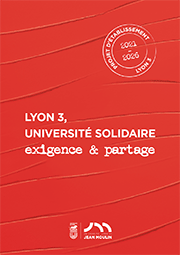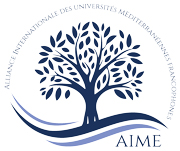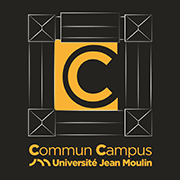AccueilRechercheProgrammes et productions scientifiquesThèsesThèses soutenuesThèses soutenues - 2006-2021Thèses soutenues - 2018
-
Partager cette page
- Recherche,
JIANG Xiaolu
“为人生的文学”-茅盾写作的主体性实践 Une littérature de la vie : sur la mise en ?uvre de la subjectivité dans les écrits de Mao Dun
Publié le 31 janvier 2020 – Mis à jour le 31 janvier 2020
Thèse en Etudes Transculturelles, soutenue le 18 décembre 2018.
Le résume en fran?ais : Mao Dun (茅盾,4 Juillet 1896- 27 Mars 1981), est un célèbre écrivain et théoricien du réalisme chinois moderne. Ses écrits et ses théories littéraires comportent l’expression de l’expérience humaine, le lien entre la littérature et l’esthétique, et les points communs entre la littérature et la finance. En fait, l’écriture du réalisme de Mao Dun est une autre pratique sociale étroitement liée à la subjectivité. Son écrit est un processus de construction, visant à trouver le lien entre la connaissance de la réalité et l’esthétique et les désirs humains. En d’autres termes, le réalisme est plus qu’un récit qui se rapporte à la réalité et à la métaphore. Comme une autre pratique sociale, il se concentre davantage sur le processus de transformation de la subjectivité et de la connaissance. Cela inclut la relation entre la connaissance de soi et la connaissance de la réalité, la question universelle dans la construction d’image typique, la question esthétique dans la littérature révolutionnaire et l’influence du système capitaliste sur la transformation de la subjectivité humaine. Ma recherche vise à mettre en évidence le risque de stratégie immunitaire posé par les méthodes ontologiques dans la recherche du réalisme chinois. ? travers les romans de Mao Dun, revenant aux textes et aux théories, faire l’étude du réalisme chinois revient à faire attention à l’esthétique humaine et à la relation entre la réalité et la construction de la subjectivité. Sur cette base, le réalisme n’est pas un outil d’accomplissement de l’histoire, mais un processus de ? mise en forme ? étroitement lié à la subjectivité. Les théories et les romans de Mao Dun présentent le système capitaliste et la stratégie de paralysie et de transformation. Ils sont la fa?on la plus efficace de contrer le système capitaliste et aussi un objet de recherche important qui nous oblige à reconsidérer la littérature du réalisme chinoise d’aujourd’hui.
Le résumé en anglais: Mao Dun (茅盾, July 4, 1896 - March 27, 1981), a famous writer and theoretician of modern Chinese realism, whose writings and literary theories include the expression of human experience, the link between literature and aesthetics, and the commonalities between literature and finance. In fact, the writing of Mao Dun's realism is another social practice which closely relates to subjectivity. His writing is a construction process, aimed at finding the link between knowledge of reality and aesthetics and human desires. In other words, realism is more than a narrative that relates to reality and metaphor. As another social practice, it focuses more on the process of transforming subjectivity and knowledge which includes the relationship between self-knowledge and knowledge of reality, the universal question in typical image construction, the aesthetic question in revolutionary literature, and the influence of the capitalist system on the transformation of human subjectivity. This research aims to highlight the risk of immune strategy posed by ontological methods in the search for Chinese realism. Through the novels of Mao Dun, returning to texts and theories, studying Chinese realism means paying attention to human aesthetics and the relationship between reality and the construction of subjectivity. On this basis, realism is not a tool for accomplishing history, but rather a process of "shaping" that closely related to subjectivity. Mao Dun’s theories and novels present the capitalist system and the strategy of paralysis and transformation. They are the most effective way to counter the capitalist system and it is also an important research subject that forces to reconsider the literature of Chinese realism today.
Le résumé en anglais: Mao Dun (茅盾, July 4, 1896 - March 27, 1981), a famous writer and theoretician of modern Chinese realism, whose writings and literary theories include the expression of human experience, the link between literature and aesthetics, and the commonalities between literature and finance. In fact, the writing of Mao Dun's realism is another social practice which closely relates to subjectivity. His writing is a construction process, aimed at finding the link between knowledge of reality and aesthetics and human desires. In other words, realism is more than a narrative that relates to reality and metaphor. As another social practice, it focuses more on the process of transforming subjectivity and knowledge which includes the relationship between self-knowledge and knowledge of reality, the universal question in typical image construction, the aesthetic question in revolutionary literature, and the influence of the capitalist system on the transformation of human subjectivity. This research aims to highlight the risk of immune strategy posed by ontological methods in the search for Chinese realism. Through the novels of Mao Dun, returning to texts and theories, studying Chinese realism means paying attention to human aesthetics and the relationship between reality and the construction of subjectivity. On this basis, realism is not a tool for accomplishing history, but rather a process of "shaping" that closely related to subjectivity. Mao Dun’s theories and novels present the capitalist system and the strategy of paralysis and transformation. They are the most effective way to counter the capitalist system and it is also an important research subject that forces to reconsider the literature of Chinese realism today.
Mots-clés : Mao Dun, Le réalisme, La subjectivité, La pensée de l’image, La littérature révolutionnaire, Le capitalisme
Keywords : Mao Dun, Realism, Subjectivity, Thinking in images, Revolutionary Literature, Capitalism
Directeur(trice) de thèse : SOLOMON Jon
Membres du jury :
- M. SOLOMON Jon, Directeur de thèse, Professeur des universités, Université Jean Moulin Lyon 3,
- Mme C.H. LIU Joyce, Professor, National Chiao Tung University Taipei,
- M. XU Zhiwei, Professor, Harbin Normal university, Harbin Chine,
- Mme JIN Siyan, Professeure des universités, Université D’Artois, Arras.
Président (e) du jury : Siyan JIN
Documentation
Mise à jour : 31 janvier 2020







